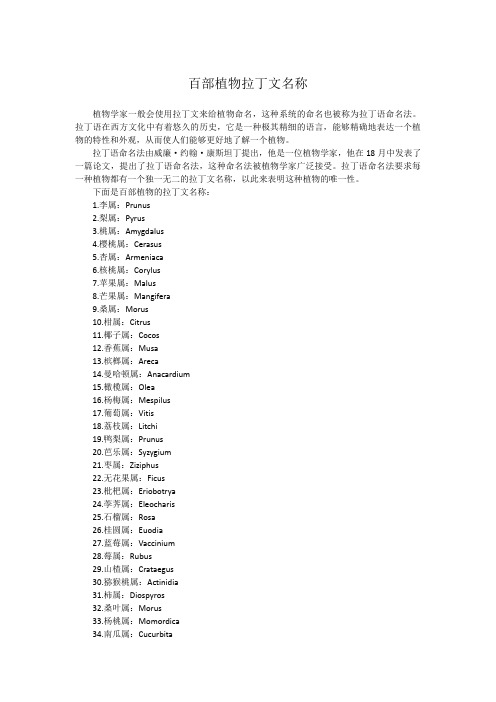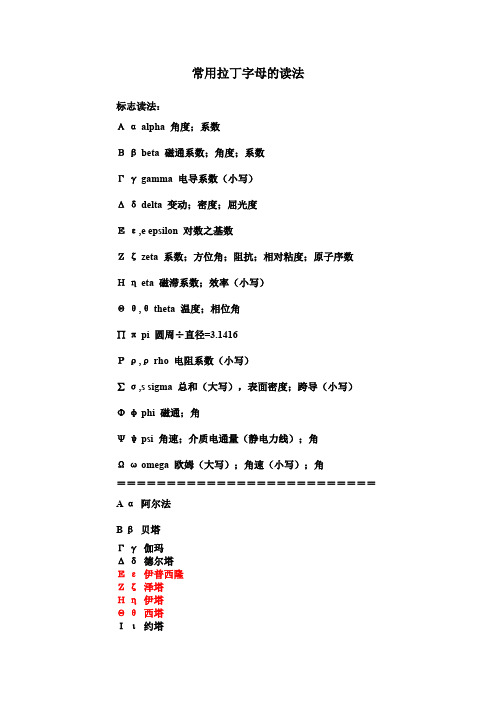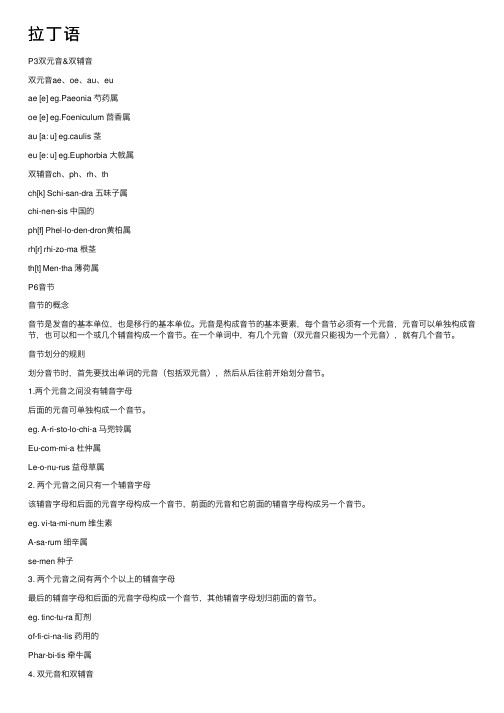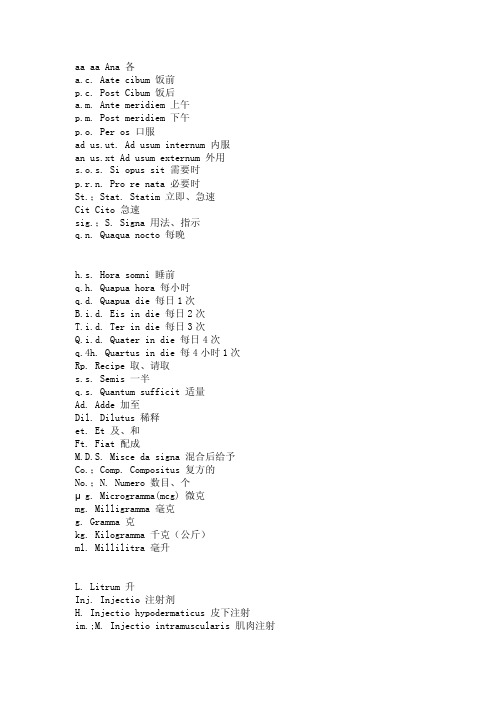常见拉丁文
拉丁文缩写一览表

拉丁文缩写一览表
以下是一些常见的拉丁文缩写及其意义的一览表:
1. etc. - et cetera(等等)
2. e.g. - exempli gratia(例如)
3. i.e. - id est(即,也就是说)
4. vs. - versus(对比)
5. cf. - confer(参考)
6. et al. - et alii(和其他人)
7. viz. - videlicet(即,换句话说)
8. N/A - non applicable(不适用)
9. i.a. - inter alia(其中之一)
10. ibid. - ibidem(同上所述)
11. op. cit. - opere citato(在前述著作中)
12. q.v. - quod vide(请见)
13. a.m. - ante meridiem(上午)
14. p.m. - post meridiem(下午)
15. ca. - circa(大约)
16. v. - versus(对)
17. ad hoc - ad hoc(特别为此目的)
18. et seq. - et sequens(及其后续)
19. N.B. - nota bene(请注意)
20. c.f. - confer(请参考)
这只是一小部分拉丁文缩写,还有许多其他用途和含义的缩写词存在。
请注意,这些缩写词可能因特定领域或上下文而有所差异。
百部植物拉丁文名称

百部植物拉丁文名称植物学家一般会使用拉丁文来给植物命名,这种系统的命名也被称为拉丁语命名法。
拉丁语在西方文化中有着悠久的历史,它是一种极其精细的语言,能够精确地表达一个植物的特性和外观,从而使人们能够更好地了解一个植物。
拉丁语命名法由威廉·约翰·康斯坦丁提出,他是一位植物学家,他在18月中发表了一篇论文,提出了拉丁语命名法,这种命名法被植物学家广泛接受。
拉丁语命名法要求每一种植物都有一个独一无二的拉丁文名称,以此来表明这种植物的唯一性。
下面是百部植物的拉丁文名称:1.李属:Prunus2.梨属:Pyrus3.桃属:Amygdalus4.樱桃属:Cerasus5.杏属:Armeniaca6.核桃属:Corylus7.苹果属:Malus8.芒果属:Mangifera9.桑属:Morus10.柑属:Citrus11.椰子属:Cocos12.香蕉属:Musa13.槟榔属:Areca14.曼哈顿属:Anacardium15.橄榄属:Olea16.杨梅属:Mespilus17.葡萄属:Vitis18.荔枝属:Litchi19.鸭梨属:Prunus20.芭乐属:Syzygium21.枣属:Ziziphus22.无花果属:Ficus23.枇杷属:Eriobotrya24.荸荠属:Eleocharis25.石榴属:Rosa26.桂圆属:Euodia27.蓝莓属:Vaccinium28.莓属:Rubus29.山楂属:Crataegus30.猕猴桃属:Actinidia31.柿属:Diospyros32.桑叶属:Morus33.杨桃属:Momordica34.南瓜属:Cucurbita35.菠萝属:Ananas36.柚属:Citrus37.木瓜属:Carica38.番茄属:Lycopersicon39.甘蔗属:Saccharum40.豌豆属:Pisum41.玉米属:Zea42.大豆属:Glycine43.芹菜属:Apium44.萝卜属:Brassica45.芥菜属:Brassica46.豆角属:Pisum47.芦荟属:Aloe48.蒜属:Allium49.大蒜属:Allium50.茴香属:Foeniculum51.莴笋属:Apium52.芹菜花属:Lepidium53.茄属:Solanum54.芥子属:Brassica55.南瓜子属:Cucurbita56.芫荽属:Apium57.绿豆属:Vigna58.芦笋属:Asparagus59.芹属:Apium60.茴香芽属:Foeniculum61.小麦属:Triticum62.玉米米属:Zea63.大麦属:Hordeum64.燕麦属:Avena65.黑麦属:Secale66.荞麦属:Fagopyrum67.豌豆苗属:Pisum68.马铃薯属:Solanum69.香菜属:Anethum70.芥末属:Brassica71.细辛属:Armoracia72.胡萝卜属:Daucus73.生菜属:Lactuca74.土豆属:Solanum75.茴香芽属:Foeniculum76.韭菜属:Allium77.芹菜茎属:Apium78.芦蒿属:Artemisia79.芥兰属:Brassica80.芦叶属:Acorus81.荠菜属:Atriplex82.芥蓝属:Brassica83.芹菜叶属:Apium84.芹菜花属:Lepidium85.芹菜根属:Apium86.芥苣属:Chenopodium87.芹菜秆属:Apium88.芹芽属:Apium89.十字花属:Brassica90.荠花属:Atriplex91.芥菜属:Brassica92.芹菜籽属:Apium93.芹菜梗属:Apium94.芥茉属:Lepidium95.芹菜叶子属:Apium96.芹菜茎属:Apium97.芹菜花梗属:Lepidium98.芹菜花蕾属:Lepidium99.芹菜果实属:Apium100.芹菜果皮属:Apium以上就是百部植物的拉丁文名称,拉丁语命名法是一种科学的命名方式,可以让科学家们更好地了解一个植物的特性和外观,从而更好地研究这些植物。
(完整版)常用拉丁文读法(稍加汇总),推荐文档

示/z/这个音,在美国英语里变成了辅音字母 z。
Η η,音名 ῆτα,希腊语字母名称叫做/ˈita/,美国英语叫做 eta(国际音标/itæ/),是
元音字母,表示/i/这个音。
Θ θ,音名 θῆτα,希腊语字母名称叫做/ˈθita/,美国英语叫做 theta(国际音标/'θitə/),是
也能表示电脑软件的测试版,通常指的是公开测试版,提供一般使用者协助测试并回报问
题。它是辅音字母,在古希腊语,β 读作/b/,但现代希腊语读作/v/,现代希腊语以"μπ"代
表/b/音。在美国英语里,变成了辅音字母 b,在俄语里变成了辅音字母 б。
希腊字母
Γ
γ,音名 γάμμα,希腊语字母名称叫做/ˈɣama/,美国英语叫做 gamma(国际音标
[s] ([sː], [ks], [gs], [ts], [ds])
拉丁转写
d (v, w)
st
h y (j) s (ŝ) k (q 在 u、o 前) s (可能是 塞擦音, 但具体音
值不确定,
可能是 ss,
ks, gs, ts,
ds)
Ϸϸ
Sho
[ʃ]
希腊字母读音表及意义
sh (š)
大写
小写
英文读音 国际音标
常用拉丁字母的读法
标志读法: Α α alpha 角度;系数
Β β beta 磁通系数;角度;系数
Γ γ gamma 电导系数(小写)
Δ δ delta 变动;密度;屈光度
Ε ε,e epsilon 对数之基数
Ζ ζ zeta 系数;方位角;阻抗;相对粘度;原子序数
Η η eta 磁滞系数;效率(小写)
医学拉丁语

aa——各et——及、和Rp.——取、请取sig./S.——用法、指示St./Stat.——立即、急速Cit.——急速s.o.s.——需要时p.r.n——必要时a.c.——饭前p.c.——饭后a.m.——上午p.m.——下午q.n.——每晚h.s.——睡前q.h.——每小时q.d.——每日1次B.i.d.——每日2次T.i.d.——每日3次Q.i.d.——每日4次q.4h.——每4小时1次p.o.——口服ad us.int.——内服ad us.ext.——外用H.——皮下注射im./M.——肌肉注射iv./V.——静脉注射iv gtt.——静脉滴注Inhal.——吸入O.D.——右眼O.L.——左眼O.S.——单眼O.U.——双眼No./N.——数目、个s.s——一半ug.——微克mg.——毫克g.——克kg.——千克(公斤)ml.——毫升L.——升q.s——适量Ad.——加至Aq.——水Aq.dest.——蒸馏水Ft.——配成Dil——稀释M.D.S.——混合后给予Co./Comp.——复方的Mist——合剂Pulv.——散剂Amp.——安瓿剂Emul.——乳剂Syr.——糖浆剂Tr.——酊剂Neb.——喷雾剂Garg.——含漱剂rtt./gutt.——滴、滴眼剂collyr.——洗眼剂Ocul.——眼膏Liq.——溶液剂Sol.——溶液Lot.——洗剂Linim.——擦剂Crem.——乳膏剂(冷霜)Ung.——软膏剂Past.——糊剂Ol.——油剂Enem.——灌肠剂Supp.——栓剂Tab.——片剂Pil.——丸剂Caps.——胶囊剂Inj.——注射剂iv静脉注射im肌肉注射prn必要时服用qn每晚睡前服用q2h/q6h/q8h/q12h 每隔几小时一次(如测血压,服药等)。
常见拉丁文缩写大全

常见拉丁文缩写大全缩写1:A.D.拉丁文:anno Domini释义:in the year of the Lord 耶稣纪年,公元例句:The United States Civil War began in AD 1861.缩写2:a.m.拉丁文:Ante Meridiem释义:before middday 上午,午前例句:We will meet the mayor at 10 a.m.缩写3:c., ca.拉丁文:circa释义:around, about, approximately 大约用法:用于日期中表示大概的数。
例句:The antique clock is from c.1900.缩写4:Cap拉丁文:capitulus释义:chapter 章节用法:用于英国及其前殖民地的法律章节前。
例句:Electronic Transactions Ordinance (Cap. 553).缩写5:cf.拉丁文:confer释义:"bring together" and hence "compare" 试比较用法:提示读者比较所引用资料中的说法与文中的论述,与cp.可替换使用。
例句:These results were similar to those obtained using different techniques (cf. Wilson, 1999 and Ansmann, 1992).缩写6:cp.释义:compare 比较例句:These results were similar to those obtained using different techniques (cp. Wilson, 1999 and Ansmann, 1992).缩写7:C.V.拉丁文:curriculum vitae释义:course of life 简历缩写8:etc.拉丁文:et cetera释义:and the others, and other things, and the rest 等等例句:I need to go to the store and buy some pie, milk, cheese, etc.缩写9:e.g.拉丁文:exempli gratia释义:for example, for instance 比如例句:The shipping company instituted a surcharge on any items weighing over a ton;e.g., a car or truck.缩写10:ff.拉丁文:folio释义:and following 以及接下去的例句:see page 258ff.(参见第258页以及接下去的若干页)缩写11:id.拉丁文:idem释义:the same (man) 同上用法:用来避免(在引用、脚注、书目等处)重复某个男性作者的名字。
拉丁语——精选推荐

拉丁语P3双元⾳&双辅⾳双元⾳ae、oe、au、euae [e] eg.Paeonia 芍药属oe [e] eg.Foeniculum 茴⾹属au [a: u] eg.caulis 茎eu [e: u] eg.Euphorbia ⼤戟属双辅⾳ch、ph、rh、thch[k] Schi-san-dra 五味⼦属chi-nen-sis 中国的ph[f] Phel-lo-den-dron黄柏属rh[r] rhi-zo-ma 根茎th[t] Men-tha 薄荷属P6⾳节⾳节的概念⾳节是发⾳的基本单位,也是移⾏的基本单位。
元⾳是构成⾳节的基本要素,每个⾳节必须有⼀个元⾳,元⾳可以单独构成⾳节,也可以和⼀个或⼏个辅⾳构成⼀个⾳节。
在⼀个单词中,有⼏个元⾳(双元⾳只能视为⼀个元⾳),就有⼏个⾳节。
⾳节划分的规则划分⾳节时,⾸先要找出单词的元⾳(包括双元⾳),然后从后往前开始划分⾳节。
1.两个元⾳之间没有辅⾳字母后⾯的元⾳可单独构成⼀个⾳节。
eg. A-ri-sto-lo-chi-a 马兜铃属Eu-com-mi-a 杜仲属Le-o-nu-rus 益母草属2. 两个元⾳之间只有⼀个辅⾳字母该辅⾳字母和后⾯的元⾳字母构成⼀个⾳节,前⾯的元⾳和它前⾯的辅⾳字母构成另⼀个⾳节。
eg. vi-ta-mi-num 维⽣素A-sa-rum 细⾟属se-men 种⼦3. 两个元⾳之间有两个个以上的辅⾳字母最后的辅⾳字母和后⾯的元⾳字母构成⼀个⾳节,其他辅⾳字母划归前⾯的⾳节。
eg. tinc-tu-ra 酊剂of-fi-ci-na-lis 药⽤的Phar-bi-tis 牵⽜属4. 双元⾳和双辅⾳双元⾳和双辅⾳在划分⾳节时,应视为⼀个原因或辅⾳不能分开。
eg. A-ri-sae-ma 天南星属Pae-o-ni-a 芍药属Foe-ni-cu-lum 茴⾹属cau-lis 茎藤pneu-mo-ni-a 肺炎rhi-zo-ma 根状茎Men-tha 薄荷属chi-nen-sis 中国的Phel-lo-den-dron 黄柏属5. qu、gu、gn、sc、st、sp在划分⾳节时,上述字母组合应视为⼀个辅⾳字母,不能分开。
常用医学拉丁文

aa aa Ana 各a.c. Aate cibum 饭前p.c. Post Cibum 饭后a.m. Ante meridiem 上午p.m. Post meridiem 下午p.o. Per os 口服ad us.ut. Ad usum internum 内服an us.xt Ad usum externum 外用s.o.s. Si opus sit 需要时p.r.n. Pro re nata 必要时St.;Stat. Statim 立即、急速Cit Cito 急速sig.;S. Signa 用法、指示q.n. Quaqua nocto 每晚h.s. Hora somni 睡前q.h. Quapua hora 每小时q.d. Quapua die 每日1次B.i.d. Eis in die 每日2次T.i.d. Ter in die 每日3次Q.i.d. Quater in die 每日4次q.4h. Quartus in die 每4小时1次Rp. Recipe 取、请取s.s. Semis 一半q.s. Quantum sufficit 适量Ad. Adde 加至Dil. Dilutus 稀释et. Et 及、和Ft. Fiat 配成M.D.S. Misce da signa 混合后给予Co.;Comp. Compositus 复方的No.;N. Numero 数目、个μg. Microgramma(mcg) 微克mg. Milligramma 毫克g. Gramma 克kg. Kilogramma 千克(公斤)ml. Millilitra 毫升L. Litrum 升Inj. Injectio 注射剂H. Injectio hypodermaticus 皮下注射im.;M. Injectio intramuscularis 肌肉注射iv.;V. Injectio intravenosus 静脉注射iv gtt.* Injectio intiavenosus gutta 静脉注射O.D. Oculus dexter 右眼O.L. Oculus laevus 左眼O.S. Oculus sinister 左眼O.U. Oculus uter 双眼Inhal. Inhalatio 吸入Tab. Tabellae 片剂Pil. Pilula 丸剂Caps. Capsule 胶囊剂Pulv. Pulvis 散剂Amp. Ampullae 安瓿剂Aq. Aqua 水Aq.dest. Aqua destillata 蒸馏水Mist. Mistura 合剂Emul. Emulsio 乳剂Syr. Syrupus 糖浆剂Tr. Tinctura 酊剂Neb. Nebula 喷雾剂Garg. Gargarisma 含漱剂Gtt.tgutt. Gutta;Guttae 滴、滴眼剂Collyr. Collyrium 洗眼剂Ocul. Oculentnm 眼膏Liq. Liquor 溶液剂Sol. Solutio 溶液Lot. Lotio 洗剂Linim Linimentum 擦剂Crem. Cremor 乳膏剂(冷霜)Ung. Umguentum 软膏剂Past. Pasa 糊剂Ol. Oleum 油剂Enem. Enema 灌肠剂Sipp. Suppositorium 栓剂。
拉丁文释义

园林树木名释1.苏铁Cycas revoluta<阴>苏铁属,属名来自希腊词kykas,是一种在埃及生长的棕榈,指本属植物的外形似棕榈。
种名revoluta意为外卷的、反卷的,指本种叶子裂片边缘反卷。
2.银杏Ginkgo biloba<阴>银杏属,属名来自日语ginkgo,意为金果,指本属植物的果为黄色。
种名bi-loba 意为二浅裂的,指本种植物的叶子顶端中部二浅裂。
3.异叶南洋杉Araucaria heterophylla<阴>南洋杉属,属名来自地名Arauco,在智利,是该属模式种的产地。
种名hetero-phylla 意为异形叶的。
4.辽东冷杉Abies holophylla<阴>冷杉属,属名来自拉丁语abeo,意为升起来,指本属植物某些种植株高大。
种名holo-phylla意为全缘叶的。
5.云杉Picea asperata<阴>云杉属,属名来自拉丁语picea,意为松脂。
种名asperata意为粗糙的。
6.红皮云杉P. koraiensis属名同上。
种名korai-ensis意为高丽的(Korea意为朝鲜),指本种在朝鲜有分布。
7.华北落叶松Larix principis-rupprechtii<阴>落叶松属,属名来自希腊语larix,意为落叶松。
种名中principis为princeps (帝王)的所有格,意为帝王的。
8.金钱松Pseudolarix amabilis<阴>金钱松属,属名来自希腊语pseudes(假的)+属名Larix(落叶松属)。
种名amabilis 意为可爱的。
9.雪松Cedrus deodara<阴>雪松属,属名来自希腊语kedros,意为雪松。
种名deodara来自梵文devadaru, 意为神树。
10.油松Pinus tabulaeformis<阴>松属,属名来自拉丁语,意为松。
- 1、下载文档前请自行甄别文档内容的完整性,平台不提供额外的编辑、内容补充、找答案等附加服务。
- 2、"仅部分预览"的文档,不可在线预览部分如存在完整性等问题,可反馈申请退款(可完整预览的文档不适用该条件!)。
- 3、如文档侵犯您的权益,请联系客服反馈,我们会尽快为您处理(人工客服工作时间:9:00-18:30)。
英文中常见拉丁文汇总Must-Learn Terms 必记的术语:If you don’t know these Latin terms, get to learning them ASAP, as they are commonly used in speaking and writing and may be hard to avoid.1、The direct translation of this term is "by itself" and it means just that when used in English as well. You could use it to say that you don’t find chemistry boring per se (by itself, intrinsically), but this professor’s voice puts you to sleep.例如:就化学本身而言我并不讨厌它,可是教授上课的声音总是让我想打瞌睡。
Per se: (就其本身而言)2、From the Latin meaning "to change" or "turn around," this term means to reverse the order of something . This quote from Samuel Butler provides an example, "In the midst of vice we are in virtue, and vice versa."Vice versa: (反之亦然)3、If you don’t know this term already, you’ll become quite familiar with it once you graduate from college. The literal translation is "dear/bountiful mother" but you’ll find it used in everyday language to denote the college or university from which one has graduated.Alma mater: (母校尤指大学)4、Whether it’s in writing, painting, sculpture or music, this Latin term denotes the greatest work done by an artist-- a true masterpiece.Magnum opus(大师之作/绝好的艺术作品):5、While it’s literal translation means "good faith" this term has a few different shades of meaning in modern language. In legal terms, it is used to represent something that is presented without deception or fraud, or literally in good faith, honest, sincere and lawful. It is more commonly used to mean something that’s the real deal or truly authentic.Bona fide(在法律术语中指良好的意图/一般表示真诚的和善意的):6、In Latin, this word means as if or as though and in English it is used as both an adjective in its own right and as a part of a compound word. It simply designates something that resembles something else but doesn’t quite have all the same features.Quasi(类似的,有如):7、Cicero coined this term, most likely taken from the Greek, to mean "a second self" or "another I" and its modern meaning hasn’t changed much today. Many people have an alter ego, or another, perhaps hidden aspect of themselves. One example fro m popular culture is Beyonce’s alter ego, Sasha Fierce.Alter ego(密友,或者个性的另一面):8、If you repeat something verbatim you repeat it in exactly the same words, word for word with no changes and no improvisation.Verbatim(逐字逐句的/地):9、From the Latin meaning "the state in which" this term is used today to designate the existing state or condition of things. For example, if you’re making money off of a high pollution industry it is to your interests to maintain the status quo when it comes to environmental law.Status quo (现状):Writing 写作的时候常用到的拉丁文:Knowing just what these terms and words mean can be a big help in improving your reading comprehension.知道这些拉丁文可以有效地提高你的阅读理解能力。
1、Found in writing, this Latin word most commonly finds a home in brackets (like this: [sic]) when quoting a statement or writing. It indicates that there is a spelling or grammar error (or just something out of the ordinary) in the original quotation and that the publication has only reproduced it faithfully, not made an error of their own.Sic(这个是指原作品中出现了错误,编辑在此指出):2、You’ve likely seen this term in writing before, even if you weren’t aware as it is commonly abbreviated to i.e. In Latin, it means "that is" and is used in English when the speaker or writer wants to give an example or explanation that specifies a statement.Id est(缩写是i.e.,通常在作者想要给出具体的例子和解释的时候):3、In direct translation, this term means, "God out of a machine" and it harkens back ancient Greek and Roman plays. When the plot would become too tangled or confusing, the writers would simply bring in God, lowered in via a pulley system (the machine) and he would wrap it all up. Today, it’s still used in literature to describe a plot where an artificial or improbable means of resolving a conflict is used.Deus ex machina(解围的人或事件):4、You’ll often see this term abbreviate d to e.g. in writing. It means "for the sake of example" and when it see it in a sentence you can expect that is will be followed by some examples.Exempli gratia(缩写是e.g.,这通常会用在例子前面,for the sake of example):5、 Few out there aren’t familiar with this term but may not know it as well when it’s spelled out like this and not abbreviated as etc. Meaning "and the others" it is used to denote that a list of things could continue ad infinitum (see below for definition) and that for the sake of brevity it’s better to just wrap things up with a simple etc.Et cetera(缩写是etc. 意思是and the others还有其他的):6、Back in the days when books were rarer and more expensive commodities than they were today, it was common to mark your books with a label bearing your own name and this phrase which means "from the library of." While not as common today, some true bibliophiles still use the labels.Ex libris(专指书籍从...图书馆来):7、Another abbreviated term, this word is more commonly seen in research writing in the form of "ibid." From the Latin for "in the same place" it is found in footnotes and bibliographies to designate that the same source has been cited twice in succession.Ibidem(缩写是ibid,常被用在文献页,指同一个资料来源被引用了两次):8、You’re unlikely to encounter this Latin phrase in its unabbreviated form, and will most likely only ever see it as et al when included. This is also a term that is found in footnotes and bibliographies which allows writers to refer to a large number of authors without having to write each name out (for example, you could say that your source is Dr. Henry Jones et al.)Et alii(缩写是et al,通常用在一本合著的书的某一个作者名字之后以省略罗列其他的作者名字):Everyday Talk 日常生活中常用到的拉丁语:You’ve likely heard these words and phrases on the news or in conversations, and if you didn’t know what they meant then, these definitions will help make it clear now.1、You might be able to guess what this phrase means simply through its similarity to the word we use in English. It means "to infinity" and can be used to describe something that goes on, seemingly or actually endlessly, as some students might feel about certain classes.Ad infinitum (to infinity 无止尽的):2、In Latin, de facto means "from the fact" and in use in English it is often used to distinguish was is supposed to be the case from what is actually the reality. For example, legally, employers are not allowed to discriminate in hiring because of age, but many still practice de facto (in reality, in fact) discrimination.De facto(事实上):3、No, this phrase doesn’t mean that the cute little dog from ate something, it means in all or entirely. Think of it as saying "in total" in a really weird voice.In toto(in total, 总的来说/整体上): The Wizard of Oz4、Meaning "by the fact itself" this commonly used and misused term is denotes when something is true by its very nature. For example, if you don’t f eed your dog you are ipso facto a bad owner.Ipso facto(本质上/事实证明):5、When you were a child, your mind might have been more of a tabula rasa than it is today. This Latin phrase means "clean slate" and denotes something or someone not affected by experiences and impressions.Tabula rasa(纯洁质朴天真的状态):6、Those who hate to fly or get seriously seasick will be able to put this term to good use. It means firm ground, and you might be thanking your lucky stars to be back on it after a trip through the air or rough waters.Terra firma(坚实的陆地):7、If you want to admit your own guilt or wrongdoing in a situation, use this Latin phrase that translates literally to "my fault." It’s a bit like a fancier, less outdated way of saying "my bad."Mea culpa(是我的错):8、From the Latin meaning an "unacceptable person" this term designates someone who’s no longer welcome in a social or business situation.Persona non grata(不受欢迎的人):9、If something happens in situ it happens in place or on site, though the term often designates something that exists in an original or natural state. Like a rare species sighted in situ or an invaluable artifact found on an archeological site.In situ(现场,就地):10、Most students will be familiar with this term because of modern fertility treatments, but have you ever considered what the term actually means? In Latin, in vitro means "in glass" and any biological process that occurs in the laboratory rather than in the body or a natural setting can be called in vitro.In vitro(在试管内):11、While an experiment taking place in a glass test tube might not cause a stir, many are up in arms about this kind of experimentation. In vivo means "within the living" and the two most common examples of this kind of experimentation are animal testing and clinical trials.In vivo(在活体内):12、During your history courses, you’re bound to encounter this term. It means in the most basic sense "before the war" and while it can be applied to any war it is most commonly used to refer to the American Civil War and the Antebellum Era the preceded it.Ante bellum(战前,尤指美国南北战争):Arguments and Logic 做逻辑和争论:Representing arguments as old as philosophy itself and the terms associated with them, these terms are good to know for a well-rounded education.1、You might come across this term in classes about logic or reasoning. It means taking a general law or idea and applying it to a particular instance without needing experimentation or observation. An example of an a priori statement that is used is, "all bachelors are single." You do not need to observe this to see that it is true because, by definition, bachelors must be single.A priori:2、A posteriori arguments are different than a priori because they are based on actual observation or experimentation. Continuing on the previous example, an a posteriori example of reasoning might be that "some bachelors are happy." This can be based on real life observation isn’t a given based on what a bachelor is.A posteriori3、This Latin term is used to describe an argument that has been taking place to the point of nausea, often with the same arguments being rehashed over and over for years until everyone, except a select few, are simply sick to death of the whole thing.Ad nauseam:4、Simply put, ergo means therefore and you can exchange it with therefore or hence in any sentence and maintain the same meaning. For example, you could say, "I think, ergo I am" without changing the meaning of the original.Ergo:Legal Language:法律术语One place where Latin words are very commonly used is in the courtroom. Learn some of these basic legal words to help you better understand Law and Order and how the legal process works.1、Meaning "in command of one’s mind" this term is used in the legal field to denote someone who is competent to stand trial and not encumbered by mental illness or pis mentis:2、If you’ve ever watched a legal drama on TV, you’ve more than likely heard this term thrown around but perhaps haven’t given much thought as to what it really means. The word subpoena comes from the Latin meaning "under penalty" and if someone delivers a subpoena to you have to respond or they’ll be some big penalties under the law.Subpoena:3、In court, or outside of it for that matter, this term is used to designate an argument that attacks someone’s character rather than addressing a question or issue at h and. By attacking character, these arguments appeal to emotions and prejudices rather than reason or logic.Ad hominem:4、A writ of habeas corpus (literally, have the body) requires a person to appear before the court in person, generally to ascertain whether or not the detention of that person is lawful. Habeas corpus cannot be suspended unless there is reason to believe that a person could pose a danger to the public.Habeas corpus:5、Pro bono means "for the good" and it’s a term used to designate when something is done free of charge. While the term can be applied in any field, it is most commonly used to describe legal services.Pro bono:6、There is a big difference between murder and manslaughter, and mens rea is what separates the two. Mens rea means "guilty mind," and those who go into a crime intending to commit ithave it, differing from those who commit a crime accidentally or without advance planning.Mens rea:Business:商业用词It’s always good to know the language of business, especially in such a competitive market. No matter what field you enter, you’re bound to hear these words at some point in yo ur career.1、From the Latin meaning "to this," this term gained popularity in the mid-1600s and it still used today. It refers to something that is formed or done quickly to meets the needs of a particular problem or issue without regard to a more general application and generally lacking advance planning.Ad hoc:2、Meaning "by the day" a per diem in most uses today designates a daily allowance used in traveling for work. It can also mean a per-day rate or that someone is paid on a daily basis. Other common similar terms are per annum (by the year) and per capita (by the person.)Per diem:3、A curriculum vitae is basically a fancy way to describe a resume. While it means literally "the course of one’s life" the terms is applied to mean a short list of your accomplishments and training-- something any grad will need to think about putting together soon.Curriculum vitae:4、This Latin phrase is someth ing you’re likely familiar with in everyday life. It means to charge ata proportional rate. So if a service is $100 for 10 hours, then one would cost $10 pro rata.Pro rata:5、While Anthony Hopkins so sinisterly used this phrase in , in everyday life it’s often used to describe an exchange of value necessary for a contract to take place. From the Latin meaning "this for that," it gets used in everywhere from the courtroom to the bedroom in modern English.Quid pro quo:The Silence of the LambsQuotes and Sayings:引用及典故These quotes and sayings in Latin get tossed around, put on bumper stickers and repeated in conversations so they’re well-worth knowing.1、This well-known phrase comes from a poem by Horace. While there have been arguments about the exact translation, it is most commonly held to mean "seize the day" encouraging individuals to live life to the fullest today without expectation of a tomorrow.Carpe diem:2、Translated from the Latin, the quote means "I think, therefore I am" and comes from the writing of philosopher Rene Descartes.Cogito ergo sum:3、These famous words were purported uttered by Roman emperor Julius Caesar after a short war with Pharnaces II of Pontus. Translated, it means "I came, I saw, I conquered" an adage you can hopefully keep in mind come finals time.Veni, vidi, vici:4、If you’re old enough to drink or have been around others who have imbibed, you’re more than likely already familiar with the wisdom behind this quote from Pliny the Elder meaning, "in wine there is the truth." It is often followed up with "in aqua sanitas" or "in water there is health"-- something all college students should remember.In vino veritas:5、Simply take a look at American currency to see this Latin phrase in use. It means "out of many, one" and is found on anything bearing the seal of the United States.E pluribus unum:6、Et tu, Brute?: These are the famous last words of Julius Caesar after he is murdered by hisfriend Marcus Brutus in Shakespeare’s Julius Caesar. They mean "Even you, Brutus?" and are used poetically today to designate any form of the utmost betrayal.。
